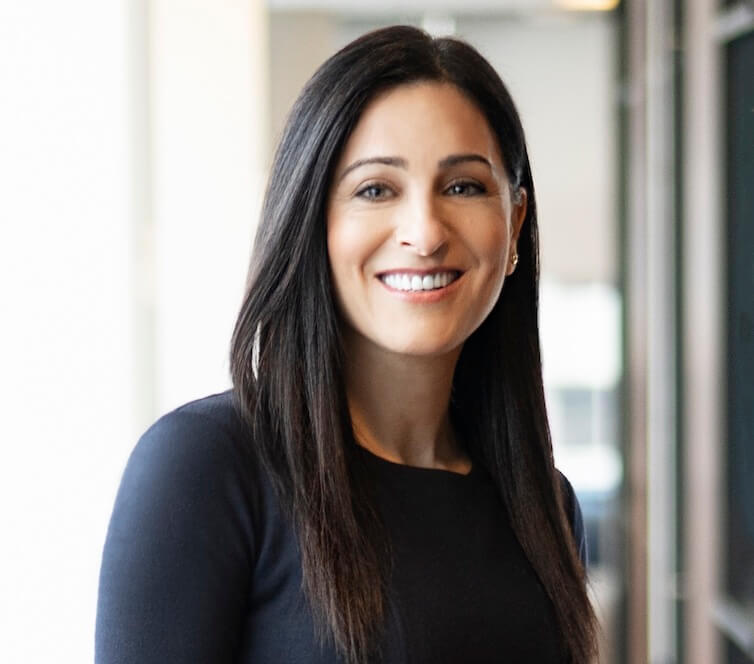Rola Dagher is as unique as her name in Canada’s corporate leadership strata. In a world where not one of the companies on the Toronto Stock Exchange’s main index (TSX 60) has a female at the helm, the president of Cisco Systems Canada happens to be both a woman and a refugee-turned-head of a billion-dollar company.
Born and raised in a small village near Sidon, Lebanon, Dagher immigrated to Canada a little over thirty years ago during the last few years of the country’s crushing civil war. When she arrived in 1989 as a 17-year-old new mother, she was fleeing political strife and a challenging arranged marriage. She didn’t speak a word of English.
“I’m incredibly proud of all the hardships I’ve gone through from being born and raised in a war zone and spending most of my early life in a bomb shelter to coming here and learning everything from scratch.”
Dagher had studied accounting and finance in Lebanon at Middle East College, but finding a job in Canada was initially challenging. Her earliest role in telecommunications was as a Bell telemarketer. By the end of her fifteen years there, she had climbed through the ranks to a director post.
“I don’t have a master’s degree in technology or engineering or anything like that, I was just determined to succeed no matter what.”
Dagher left Bell to take an executive sales director job at Dell Canada before eventually becoming vice president of the computer firm’s data storage division. In 2019, she joined Cisco Systems Canada—the networking hardware and telecommunications equipment and service provider—as president.
“I got to where I am today because of my determination and the passion I have for technology and people,” says Dagher.
This passion for people shows up in her leadership. “My style is very simple,” she remarks, “it’s servant leadership.” She believes in empowering her team and is adamant about the importance of building and supporting the people she works with. “People join organizations, but people leave people,” she says matter-of-factly.
But she agrees that it’s not that easy for women to succeed in the tech sector. While it’s even more challenging for someone with her earlier history, the industry has a long way to go. Dagher’s three-pronged recipe for success for women in the corporate world: advocate for yourself, find a mentor and raise your hand.
“I’m incredibly proud of all the hardships I’ve gone through from being born and raised in a war zone and spending most of my early life in a bomb shelter to coming here and learning everything from scratch.”
She also stresses the importance that failure had in her life, clarifying that she was always keen to learn from it. “Giving up,” she goes on, “was never an option.”
Dagher likes to pay those lessons forward. Case in point: She heads a Cisco career development group called Connected Women that makes sure young female employees and interns feel like they belong and can have influence within the company. “Our summer internship program is very well paid and we’re very proud of it. We fly them out to San Jose [Cisco headquarters] for a week or two of training and they actually work on innovative challenges,” she explains. The competitive program last year saw 700 applicants for 22 positions.
And with her own experience with forced displacement, Dagher made it a point for Cisco Canada to be involved with Lifeline Syria—a not-for-profit organization that assists in sponsoring, welcoming, and resettling Syrian refugees in Canada—by training and hiring refugees in the tech sector.
These days, the private sector’s foot-dragging on environmental issues is what worries her most. “We’re not moving fast enough. Not enough companies are jumping on it, and a lot are still parking it in the back.”
In an era of accelerated progress, technology is at the heart of every industry disrupting business as usual. If, as a tech corporation, you’re not thinking about the environment and sustainability in relation to your technology, Dagher argues it will be very difficult to succeed.
“At Cisco we take a lot of pride in ensuring we are part of giving back from a responsibility perspective.” For one, Cisco’s Bridge to Possible campaign highlights all the ways in which the company aims to connect people, places, ideas and things through a secure network, and to minimize emissions generated by transportation. That includes enabling workers at companies around the world to work from home and call in through WebEx technology instead of driving into the office.
“We’re not moving fast enough. Not enough companies are jumping on [sustainability], and a lot are still parking it in the back.”
Cisco’s sustainable procurement practices aim to eliminate one million tons of greenhouse gases from the company’s supply chain by next year. Circularity, like for other tech companies, is also a critical point. The company’s products are designed to be maintained and upgraded, ensuring that they remain within the market and away from landfills. Nearly 14,000 metric tonnes of those products were returned and recycled last fiscal year.
Dagher’s achievements are hard to miss. She was named 2019’s Woman of the Year by Women in Communications and Technology—a national association that provides opportunities for networking and professional development for women in these notoriously male-dominated industries.
She is the kind of successful immigrant that Canada loves to embrace. She worked tirelessly within the challenging corporate system to rise to the top and now makes sure to help others in return. “I’m a very proud Lebanese and a grateful Canadian,” Dagher likes to say. As an Arab immigrant woman myself, Dagher is a role model. I tell her that I recently obtained my Canadian citizenship and that interviewing her is moving for me. “Ahlan wa sahlan ou alf mabrouk [welcome and congratulations in Arabic]” she responds warmly.
“You can be anything you want to be here if you have determination.”







